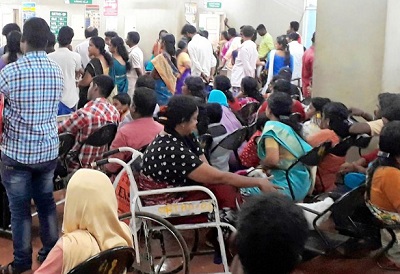Mumps Crisis In Kerala Worry Scientists As Out Of The 2,505 Cases Reported In March So Far, 856 Were Adults, Some Expressing Disease Severity!
Nikhil Prasad Fact checked by:Thailand Medical News Team Mar 12, 2024 1 year, 9 months, 1 day, 5 hours, 59 minutes ago
Medical News: Kerala, a Southern Indian state known for its vibrant culture and lush landscapes, is currently grappling with a significant public health crisis. An alarming outbreak of mumps has swept through the region, with 190 new cases reported in a single day last Sunday, bringing the total number of cases for March to a staggering 2,505. This surge contributes to a cumulative count of over 11,000 cases in the first quarter of 2024. What is particularly troubling for scientists and health officials is the unexpected prevalence of mumps among adults, many of whom had previously been vaccinated against the virus. Furthermore, a certain proportion of them are manifesting disease severity and also meningitis, encephalitis, pancreatitis and hearing loss.
 Hospitals In Kerala Overwhelmed Due To Increasing Cases Of Mumps
Hospitals In Kerala Overwhelmed Due To Increasing Cases Of Mumps
Mumps is known to cause complications, especially in adults. Such complications can include:
-inflammation of the testicles (orchitis); this may lead to a decrease in testicular size (testicular atrophy)
-inflammation of the ovaries (oophoritis) and/or breast tissue (mastitis)
-inflammation in the pancreas (pancreatitis)
-inflammation of the brain (encephalitis)
-inflammation of the tissue covering the brain and spinal cord (meningitis)
deafness
https://www.hopkinsmedicine.org/health/conditions-and-diseases/mumps-in-adults
https://www.cdc.gov/mumps/about/complications.html
The Scale of the Crisis And The Demographic Challenge
The mumps outbreak has cast a shadow over the health landscape of Kerala, prompting heightened concerns among scientists and healthcare professionals. According to local
Medical News updates, out of the 2,505 cases reported in March, a significant portion - 856 cases - involves adults. This revelation has raised eyebrows, as many of these affected adults had received vaccinations in the past. The same were also seen in many children who were previously vaccinated. The unexpected nature of the outbreak has led scientists to speculate the emergence of a new genotype or serotype of the paramyxovirus, potentially rendering existing vaccines less effective.
Of the reported cases in March, 1,649 are children, underscoring the diverse impact of the outbreak across different age groups. Health authorities are particularly worried about the spread of the virus in the Malappuram district and other northern regions of Kerala, prompting the Disease Control Centre to intensify its efforts in these areas. The need for a swift and coordinated response has become imperative to contain the outbreak and protect vulnerable populations.
Understanding Mumps
Mumps is an infectious disease caused by the paramyxovirus, primarily transmitted through airborne particles. The vi
rus targets the salivary glands, leading to painful swelling. The symptoms include swelling near the face, jawline, and ears, moderate to high fever, headache, earaches, muscle pain, fatigue, and loss of appetite. While mumps is generally considered a mild illness, it can have serious complications, including meningitis, encephalitis, and in rare cases, hearing loss.
Treatment and Prevention
As of now, there is no specific cure for mumps, and cases typically resolve naturally over a few weeks. Symptomatic treatment, such as drinking fluids, gargling with warm salt water, and consuming soft, non-acidic foods, can help alleviate discomfort. However, the most effective way to prevent mumps and its potential complications is through vaccination. The measles, mumps, and rubella (MMR) vaccine has proven highly effective in curbing the spread of the virus.
Scientific Concerns and Speculations
Scientists and health experts are expressing deep concern about the mumps outbreak in Kerala, especially given the unexpected prevalence among vaccinated adults and children. The possibility of a new genotype or serotype of the paramyxovirus emerging has become a subject of intense investigation. Researchers are working tirelessly to analyze the genetic makeup of the virus responsible for the outbreak, hoping to identify any variations that might explain the unusual pattern of infection. Understanding these genetic changes is crucial for adapting vaccination strategies and preventing future outbreaks.
Conclusion
The mumps crisis in Kerala has emerged as a significant public health challenge, demanding immediate attention and a coordinated response from health authorities. The unexpected surge in cases, particularly among vaccinated adults, has raised questions about the effectiveness of current vaccination protocols. Scientists are diligently investigating the genetic aspects of the virus to gain insights into the root causes of the outbreak. Meanwhile, efforts to contain the spread, especially in the worst-hit areas like the Malappuram district, remain a top priority. As the situation unfolds, the collaboration between scientists, healthcare professionals, and government agencies becomes paramount in overcoming this health crisis and ensuring the well-being of the affected communities in Kerala.
For the latest Mumps News, keep on logging to Thailand
Medical News.
Read Also:
https://www.thailandmedical.news/news/medical-crisis-in-kerala-india-as-pediatric-mumps-infections-crosses-more-than-10,000-cases-in-last-68-days
https://www.thailandmedical.news/news/u-s-medical-news-new-jersey-reports-mumps-outbreak-with-11-confirmed-cases-so-far-and-hundreds-being-investigated
